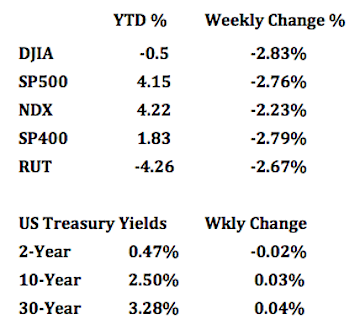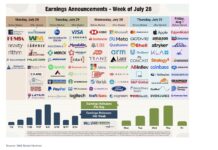 I have seen several news articles with headlines similar to the following: “Stocks See Biggest Weekly Drop In Two Years”. What does it bring to mind? Does it conjure up images of a stock market crash? Does it instill fear? I think that is the intention of the headline, so let me bring a little balance.
I have seen several news articles with headlines similar to the following: “Stocks See Biggest Weekly Drop In Two Years”. What does it bring to mind? Does it conjure up images of a stock market crash? Does it instill fear? I think that is the intention of the headline, so let me bring a little balance.
The major U.S. market indexes each declined over 2% last week. In ‘normal’ stock markets a decline of 2% in a week would seem, well….normal. The problem is that our markets have not been acting normal for the last couple of years. Based on a quick look at the S&P 500 on Google Finance, we haven’t seen a 10% correction since April of 2012. And we have to think back all the way to May of 2011 when there was a 17% decline.
The bigger story is one that I’ve highlighted the last 7 months: the divergence between fast-growth and slow-growth companies. That continues. The Russell 2000 is once again negative.. for the year!! Year-to-date is it -4.26% compared to the S&P 500 being +4.15%. And bonds continue to out-perform stocks this year. My favorite bond fund is still +6.39% so it is now handily beating the stock market indexes. Even that bond fund pales in comparison to the iShares Barclays 20+ Year Treasury Bond ETF (TLT). It is up 12.57% YTD.
Interestingly, Hedge Funds switched sides again last week. After being net short for all of 2014, last week they became net long—betting that the market would go up. Turns out that was the wrong week for them to make that change and, once again they found themselves on the wrong side of the market. Now, it looks like they have moved back to a net short position and what could be the lows of the S&P 500.
What does all this mean? It means that we need to think and approach the management of our portfolio from a multi-duration mindset. There are different cycles that will play out over different time frames. Identifying the time frame is important. For instance, we continue to be in a Bull-type market and that can continue for many more months. Within the longer term, though, we can see shorter down cycles that may only last a week or two. The key is to differentiate between the two.
Data Bank:
Any opinions expressed herein are solely those of the author, and do not in any way represent the views or opinions of any other person or entity.









